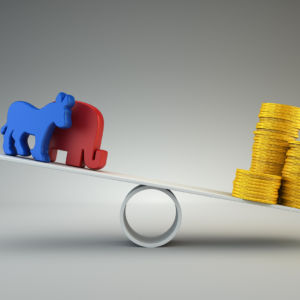Editor’s Note: For an alternative viewpoint, please see: Point: Democracy Is Not Broken
The U.S. Constitution says that ours is a government “of, by, and for the people.”
That was the vision of our Founders, and history tells the story of how our democracy has grown, from the days when only property owners had rights to embracing African-Americans and women as full voting participants. Today, there’s an extreme attack on our democracy, one that threatens to transform our government into one “of, by and for corporations and the 1 percent.”
Too many Americans feel that the system is rigged, that politicians don’t listen to people “like me.” Our standard of living has been stagnant for decades. We worry about the future for our children and grandchildren. Secretaries pay more in taxes than billionaire hedge fund operators. The 1 percent has crowded out of the rest of us in the tent of economic security.
How did this happen? One big reason — our political system is awash in money. The Citizens United and McCutcheon Supreme Court decisions unleashed the floodgates, allowing big money to pollute our politics.
Members of the House and Senate spend at least half their time raising money to win the next election. They’re talking to donors who can finance increasingly expensive campaigns — $20 million for a statewide race and $4 million for a House race — and not to people like you and me.
One need look no further that the current debate over the Trans Pacific Partnership. Some 70 percent of Americans oppose this bad trade deal. But the elites and multi-national corporations, their lobbyists and funders continue to pound their political friends to save it.
Policies that an overwhelming majority of Americans support — from action on climate change and global warming, to making the wealthy pay their fair share, to rights for working people on the job, to sensible gun laws — are going nowhere. The wealthy know that investing in politics pays off.
We will only rid ourselves of this destructive system through reforms that require politicians to rely on talking and listening to ordinary Americans. We can make this happen by fixing our campaign finance system.
Several cities and states, from New York City to Arizona, have instituted better systems to finance political campaigns. The most effective is one where every dollar raised by constituents for their choice of office seeker is matched on a 6-1 basis from a government fund. Office seekers spend more time talking to neighbors and less time on the phone with wealthy donors.
It’s not only about money. As the 1 percent has gained more political power, it’s working overtime to keep that power by restricting the voting rights of ordinary Americans. In too many states, working people face discouraging lines at polling places, attacks on their eligibility, and byzantine registration requirements. The Supreme Court’s Shelby decision eliminated the teeth in the Voting Rights Act, and states from North Carolina to Texas to Ohio couldn’t jump quickly enough to restrict citizens’ ability to vote. Twenty two states rolled back voting rights, with absurd outcomes: hour-long lines in Florida and Arizona; the Marine veteran who moves from Florida to North Carolina but is told he’s missed the registration deadline; the 94-year old grandmother in Tennessee who has voted in every past election but now is banned because her name is spelled differently on her birth certificate; the requirement for a special ID from state motor vehicle offices that are closed on Saturdays. The list goes on and on.
But those who believe in real democracy are pushing back — 27 states expanded voting rights and 31 now permit online registration.
We must take these positive steps further and implement automatic voter registration as Oregon, California and other states have done. We must rip down the barriers standing in the way of “the people” voting and dispel once and for all the myth of “voter fraud” that is used only to restrict the voting rights of ordinary Americans.
We can restore our democracy. We can get big money out of politics by making it clear that corporations aren’t people and money isn’t speech. We can put in place a system of universal voter registration, like at least 30 other countries have, to remove the barriers to voting.
These are important steps toward ensuring that our democracy provides an equal voice for all Americans. That’s how we’ll restore the faith of ordinary Americans in the political process and move closer to that vision of a government “of, by and for the people.”

